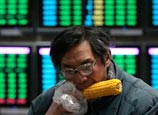
A MORE RESILIENT U.S. MARKET
The U.S. market has become far more resilient than it was before the financial crisis. Since the end of last year, it has overcome a string of challenges such as the so-called "fiscal cliff" and U.S. government's sequester cuts. It has also weathered external risks such as the Cyprus banking crisis, the Italian election gridlock and slowdown in emerging markets.
"There will be a point where money recognizes and smart money recognizes that everything is permanently and inextricably linked, therefore they will realize buoyancy and resilience of the U.S. equity market over perhaps the Chinese market," Greco said.
"Global investors are seeking safety and seeking secure markets to place their money. And when that happened, they go to the market which exhibits the most resilience and the greatest amount of strengthen. Security is here in the U.S. right now," Greco said.
Most traders think U.S. equities are oversold since the Fed's June meeting last week, when Bernanke said the central bank may moderate its pace of bond purchases later this year and may end the purchases in mid-2014 if economy continues to improve.
The U.S. market gets oversold on a short-term basis on Bernanke's "exit" timetable, Bliss said, the U.S. stock market is going to lift back up and the dip right now provides a good opportunity to buy.
Traders and analysts generally believe the U.S. equity market has a limited upside at current levels, and volatility will be a keyword for trading in the near term.
"I think by the end of the year we will be back near the highs, but I don't think we'll eclipse the highs that we've already set so far," Greco said.
Year to date, the major stock indices was still up over 10 percent despite a roughly 5 percent retreat from their all-time highs set on May 21.



















![]()
